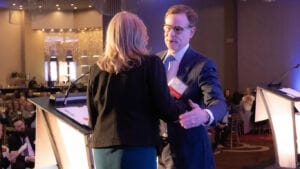 Robert D. Osborne
Robert D. Osborne
Chief Financial Officer
Russell Sigler Inc.
While many other companies have been contracting during this economic slowdown, HVAC equipment, parts and supplies company Russell Sigler Inc. has been expanding. And Chief Financial Officer Robert D. Osborne has played a pivotal role in that growth.
When Osborne began with Russell Sigler in 1984, the company’s sales were $55 million. The internal reports designed and developed by Osborne helped key managers at the company to guide and track operations, increasing sales to $221 million in 2006.
The collapse of the housing and commercial real estate markets caused Russell Sigler’s sales to fall sharply over the last two years. However, Osborne’s recent efforts have made it possible for the company to acquire Carrier’s California territory distributor, which has doubled Russell Sigler’s size and market share.
Osborne worked with Carrier’s business development department, and loan officers from Bank of America and Wells Fargo to obtain a $100 million credit line to finance the acquisition. With the addition of the California territory, Russell Sigler offices and warehouses will increase from 11 to 33, and sales for this year are anticipated to reach $295 million. In 2011, the company projects sales approaching $400 million.
 Kristi Ponczak
Kristi Ponczak
Senior Vice President and Chief Financial Officer
Rural/Metro Corporation
Rural/Metro Corporation has become the nation’s second-largest ambulance provider, thanks in no small part to Kristi Ponczak. As Rural/Metro’s senior vice president and chief financial officer, Ponczak assembled a sort of financial dream team, with experts in all areas of finance, including tax, treasury, as well as a controller.
Ponczak’s team routinely delivers accurate and on-time financial reporting services to Rural/Metro’s field operating units across the country. As a result, operating personnel can focus their time and energy on delivering quality health care.
“As CFO, you sit in the middle of the entire organization, which in my case is moving fast and furiously around me,” she said. “To ensure that all these disparate people, systems, operations, vendors, customers and investors have the right information at the right time to make the correct decision, you have to be an orchestrator and liaison.”
In 2009, Ponczak led the successful refinancing of the Rural/Metro’s senior secured debt. That move has allowed the company to extend maturities, reduce the complexity of the capital structure, increase access to pre-payable debt, and eliminate the risk of restricted payment baskets.
 Eugene S. Putnam Jr.
Eugene S. Putnam Jr.
Executive Vice President and Chief Financial Officer
Universal Technical Institute Inc.
As executive vice president and chief financial officer for Universal Technical Institute Inc., Eugene S. Putnam Jr. takes the company’s core beliefs — purpose, people and profit — to heart.
“The real interesting part about finance is ensuring that it blends well with the other values of the company,” Putnam said. “While it is important to earn an acceptable rate of return for shareholders, we must realize that goal cannot be achieved without a focus on our customers.”
Putnam joined UTI in 2008, when the nation’s credit crisis was making it difficult for students to access private loans. Putnam played a key part in UTI’s development and implementation of a proprietary loan program for students. So far, UTI has committed more than $20 million to the program.
In response to a government mandate, he also transitioned UTI’s campuses from the Federal Family Education Loan Program (FFELP) to direct lending. FFELP uses commercial lenders, relying on a federal government guaranty, to make loans to students and their parents. This year, schools were required to eliminate FFELP and implement direct lending. Students can now get their loans directly from the federal government. UTI successfully made the transition before the government’s deadline.
 Larry W. Seay
Larry W. Seay
Executive Vice President and Chief Financial Officer
Meritage Homes Corporation
While the nation’s economy didn’t officially go into recession until 2008, the home-building industry began feeling the slowdown as early as 2006. Fortunately for Meritage Homes Corporation, Larry W. Seay already was on the job.
As executive vice president and chief financial officer of Meritage, Seay anticipated the need to reduce the company’s overhead. He spearheaded the centralization of certain overhead functions at Meritage, such as accounting, finance and accounts payable, in the process saving payroll burden charges, easing audit testing and generating standardization and consistency in the organization. After the successful reorganization of his departments, others at Meritage followed suit.
“Thankfully, Meritage survived the downturn and is on firm financial footing today,” Seay said.
Seay also managed the company’s debt and capital structure, and developed relationships with financial institutions. But Seay didn’t just batten down the hatches. To help lead Meritage out of the recession, he created a new land-purchasing program. With its highly liquid cash position, Meritage has taken advantage of depressed prices by aggressively negotiating land acquisitions with troubled sellers.




